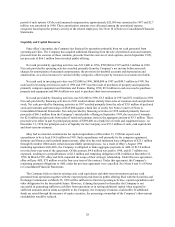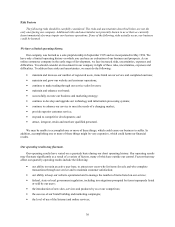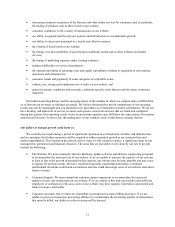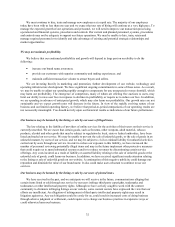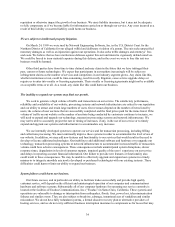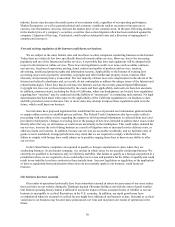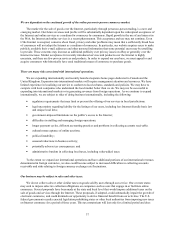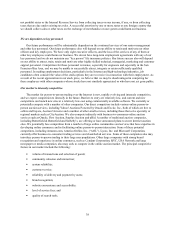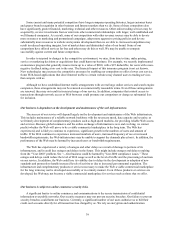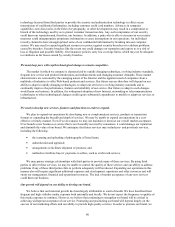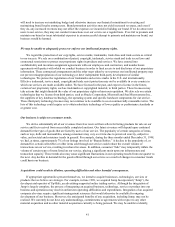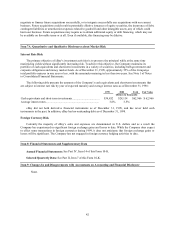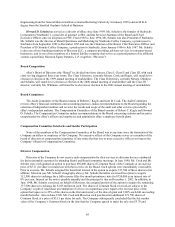eBay 1998 Annual Report Download - page 36
Download and view the complete annual report
Please find page 36 of the 1998 eBay annual report below. You can navigate through the pages in the report by either clicking on the pages listed below, or by using the keyword search tool below to find specific information within the annual report.36
industry factors may decrease the market price of our common stock, regardless of our operating performance.
Market fluctuations, as well as general political and economic conditions such as recession or interest rate or
currency rate fluctuations, also may decrease the market price of our common stock. In the past, following declines
in the market price of a company’ s securities, securities class-action litigation often has been instituted against the
company. Litigation of this type, if instituted, could result in substantial costs and a diversion of management’ s
attention and resources.
New and existing regulation of the Internet could harm our business.
We are subject to the same federal, state and local laws as other companies conducting business on the Internet.
Today there are relatively few laws specifically directed towards online services. However, due to the increasing
popularity and use of the Internet and online services, it is possible that laws and regulations will be adopted with
respect to the Internet or online services. These laws and regulations could cover issues such as online contracts,
user privacy, freedom of expression, pricing, fraud, content and quality of products and services, taxation,
advertising, intellectual property rights and information security. Applicability to the Internet of existing laws
governing issues such as property ownership, copyrights and other intellectual property issues, taxation, libel,
obscenity and personal privacy is uncertain. The vast majority of these laws were adopted prior to the advent of the
Internet and related technologies and, as a result, do not contemplate or address the unique issues of the Internet and
related technologies. Those laws that do reference the Internet, such as the recently passed Digital Millennium
Copyright Act, have not yet been interpreted by the courts and their applicability and reach are therefore uncertain.
In addition, numerous states, including the State of California, where our headquarters are located, have regulations
regarding how “auctions” may be conducted and the liability of “auctioneers” in conducting such auctions. No legal
determination has been made with respect to the applicability of the California regulations to our business to date
and little precedent exists in this area. One or more states may attempt to impose these regulations upon us in the
future, which could harm our business.
Several states have proposed legislation that would limit the uses of personal user information gathered online
or require online services to establish privacy policies. The Federal Trade Commission also has recently settled a
proceeding with one online service regarding the manner in which personal information is collected from users and
provided to third parties. Changes to existing laws or the passage of new laws intended to address these issues could
directly affect the way we do business or could create uncertainty in the marketplace. This could reduce demand for
our services, increase the cost of doing business as a result of litigation costs or increased service delivery costs, or
otherwise harm our business. In addition, because our services are accessible worldwide, and we facilitate sales of
goods to users worldwide, foreign jurisdictions may claim that we are required to comply with their laws. Our
failure to comply with foreign laws could subject us to penalties ranging from fines to bans on our ability to offer
our services.
In the United States, companies are required to qualify as foreign corporations in states where they are
conducting business. As an Internet company, it is unclear in which states we are actually conducting business. We
currently are qualified to do business only in California and Ohio. Our failure to qualify as a foreign corporation in a
jurisdiction where we are required to do so could subject us to taxes and penalties for the failure to qualify and could
result in our inability to enforce contracts in those jurisdictions. Any new legislation or regulation, or the application
of laws or regulations from jurisdictions whose laws do not currently apply to our business, could harm our
business.
Our business has been seasonal.
Our results of operations historically have been somewhat seasonal in nature because many of our users reduce
their activities on our website during the Thanksgiving and Christmas holidays and with the onset of good weather.
Our limited operating history makes it difficult to assess the impact of these seasonal factors or whether or not our
business is susceptible to cyclical fluctuations in the U.S. economy. In addition, our rapid growth may have
overshadowed whatever seasonal or cyclical factors might have influenced our business to date. Seasonal or cyclical
variations in our business may become more pronounced over time and may harm our results of operations in the
future.




